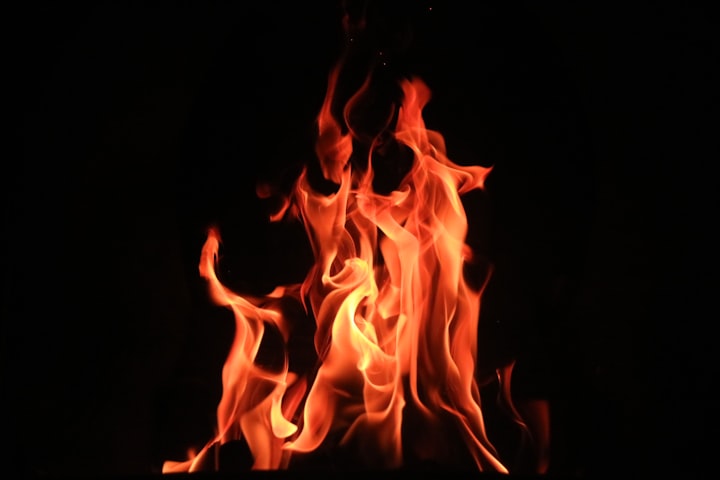Seed
Even now, the house isn't mine. In truth, I am its.

Another part of the roof in the corner bedroom fell in early this morning. The almighty crash from two floors above tore me out of a deep sleep, cocooned within the thin blankets on the pallet, and set my heart racing; usually it is the sounds of dawn, birdsong and breeze, that bring me back to myself. Moments later the burst of terror faded and I remembered the sound of two days' rain as it rushed through the gaping hole and, I knew, softened the scorched beams, eating away at the house's exposed skeleton. I imagine mold blossoming on the remaining ceiling, racing down the walls, my sole living companion now. Or perhaps small creatures have found their way inside, using shreds of her once-fine clothes to line their nest in a sheltered corner of the hall.
I can only guess: I have not ventured into the rest of the house since that night and I don't plan to. I can only hope I will be granted the ignorance of sleep when the house, or perhaps the approaching winter, or some other arbiter I haven't yet thought of, has its final say upon me.
Through my handmade curtains I can see a rosy morning light above me. I disentangle myself and rise from the floor; sleep won't return this morning. Outside, I see that the rain has also flattened the wildflowers that have been sprouting with such pride now that they are no longer deemed unsightly and unwanted. Their petals look dazed and bedraggled amidst the grass, which nearly brushes my knees by now. My small, haphazard garden against the wall is flourishing, the vegetables boastful with life. The largest tomato is pulling the stem nearly to the ground; it will make a fine lunch today. I tug it free with a snap.
Here, the land is untouched. On the other side of the house, the west, all is surely still ashes. But I read once in an almanac that land can heal itself after a fire, the purified soil eager to start anew. That was the point all along, I have realized: a cleansing of sorts. But, of course, nothing from inside the walls can live again. That is not a power we deserve.
Perhaps it is not the crumbling house that will fall away first but the world around it, the bright, breathing nature, that will swallow it whole like a forgotten tomb, grasses growing roof-high, ivy covering every surface, roots snaking their way in the ground below and cracking up through the floors. One cool morning I will find myself inside the quiet of a tree that has grown around me.
It's only then that I see it tucked beside the door, neatly sheltered underneath the gable: a box, perhaps the size of my two hands open, wrapped in smooth brown paper.
I go still. It is not the racing, fluttering alarm of this morning's fright, but a slow grinding, a dull understanding: it was not here yesterday. But it is here now. After a moment I step closer, cautiously, as though it may move on its own, the tomato still clutched in my hand. Now I can see that it bears my name on top, written neatly in black ink, and no other markings.
Someone came here. Made their way to the town and through it, perhaps receiving shrewd glances, whispers and half-truths if they bothered to ask questions. All the way down the curving road — I hadn't once thought about how the house must now look from a distance, viewed as a whole, a hole, an unwhole hole — but now I imagine the visitor catching sight of it as they came around the last bend in the lane, the coy veil of trees suddenly lifting to reveal the scarred face, the torn flesh of a once-grand thing. Through the fence or over it, through the itching grass, to the side — the side, not the grand front entrance with its wide stairs and golden knocker where surely anyone would be drawn, but around to the green kitchen door behind which I keep myself.
How long did they stand, mere feet from me as I (slept? Ate? Dressed?) Did they raise one trembling fist to the door for a moment? Or was the box their sole intention, their step never slowing as they approached, stooped, swiveled and departed? I look around me: the only tracks in the mud are my own, made by the gardener's large boots that I have taken to wearing. (How he would despair of the state of things now!) I try to think: at what hour did the rain stop? My guest must have come before, their steps then washed away. But then — I move closer again — my surprise would be sodden, the writing smeared, the paper shredding away.
It's not so heavy when I tell my free hand to retrieve it. Perhaps a bit weightier than the tomato, which I place in the crook of my arm to open the door, stepping back into the dim kitchen. Placing both on the scrubbed wooden table and sitting in the single chair, I stare at the box, trying to understand everything that it might mean for me.
I know who it's from, of course. The handwriting is intentionally plain, no characteristic loops and harsh crosses, but there is only one real possibility. Though how he knew that I chose to remain here I cannot say. I doubt that he would have made the journey himself, he has others to complete those sorts of tasks for him. But then, perhaps this message is more important than I realize. Perhaps I am.
And: it is not a letter, but a different kind of statement. Had he simply wanted me aware that he knows where I am, and therefore what I have done and why, a single scrap of paper would have done the job. Even a sole word upon it. But this, its contents say something more, a message within a message. Just as the smoke-blackened ruin of the house reveals one story, my presence here another. And I left nothing of consequence behind when I came here, so it must be something that he believes I need, or want. But he never truly understood either.
My dreams are still filled with the sound of the chandelier crashing down into the foyer that night. More than anything else, more than any of the other sounds I heard that night from where I stood in the dark, unable to feel the chilly wind for the searing heat of the flames against my face, for some reason that sound stays inside of me.
When the bit of roof fell in this morning, for a dizzying moment I could not tell one crash from another, sleep from waking life, this day from that one. But after a moment, the panic cleared and I understood. And again now, I know what this means. At first glance, the presence of my unexpected visitor seemed to be a warning, a silent threat: you are not as alone as you believe. You are not in control. You can always be found.
But now I think it is a plea. Whatever is inside, what it says is come back. An outstretched hand. You are no less wanted here than before. Come back. You are found if you want to be.
What he could never understand is that it was only by returning to where once I was trapped that I could free myself. To return would be to accept another cage. To partake of his gift (I get up from the table and place it on the windowsill, in the now-golden sunlight) would be to turn and walk through a different door, rather than the one I have opened for myself.
I will live with my choice, beside my choice, inside of it, and no one else's. I will wait to see what it makes of me.







Comments
There are no comments for this story
Be the first to respond and start the conversation.